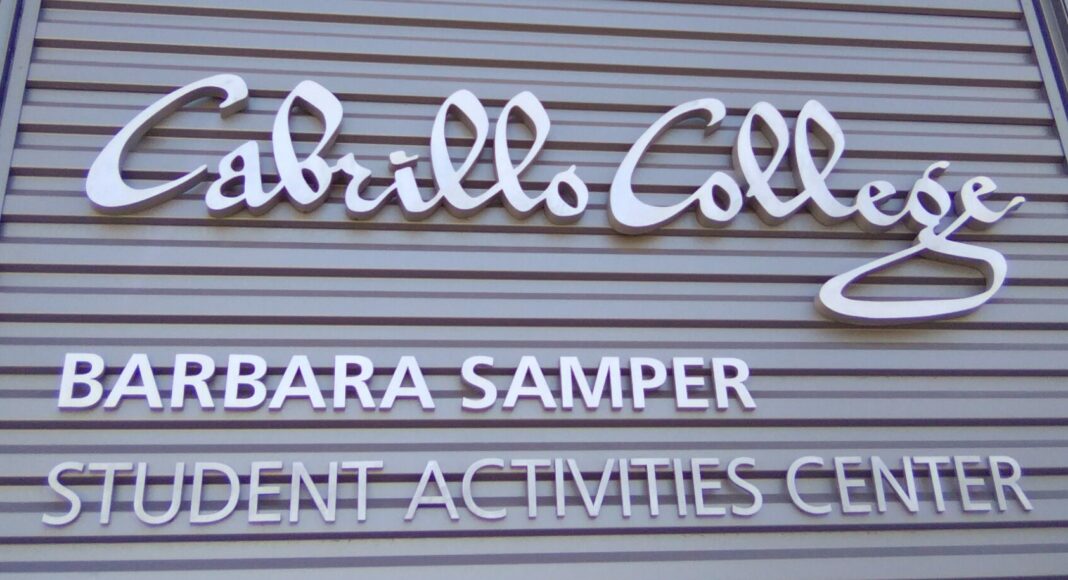Cabrillo College will keep its name for now, following the Board of Trustees’ 6-1 vote on Monday that defers selecting a new name for the college.
In a prior report to the trustees, the board’s Name Exploration Subcommittee had cited a lack of scientific polling, limited representation of student voices in discussions, unfunded renaming costs and potential loss of college funding from failed bond issues and decreased Cabrillo Foundation support as reasons to regroup and re-engage the community to solicit greater support before announcing a final choice.
Subcommittee members had also expressed dismay over the divisiveness prompted by the decision to purge the name and legacy of Juan Rodriguez Cabrillo from the school.
In her opening introduction, Trustee Christina Cuevas recounted how the turmoil created by floods, forest fires, Covid-19 quarantines and social unrest preoccupied the county to the exclusion of engaging in the Cabrillo debate.
Of the five proposed replacement names offered for consideration, Aptos College was the most popular vote-getter among community polling participants.
Trustee Steve Trujillo insisted that the winning name should be announced as planned. He was the lone vote against the delay, saying that the name change was already long overdue. Student Trustee Yefry Mata Diaz sided with Trujillo in casting his advisory vote.
Trustee Adam Spickler said that the Name Exploration Subcommittee was surprised by the strong support for the name Aptos College after public forums had suggested a growing support for the name Cajastaca.
Costa Vista College, Seacliff College and Santa Cruz Coast College were the other names under consideration.
The subcommittee will work toward a Nov. 6 presentation that will address the issues of inclusion, education and funding—all issues that figured prominently in opinions shared by those in attendance.
Opinions were divided over the fairness of allowing a countywide vote to decide the issues of removing the name Cabrillo, and the choice of names to replace it.
Proponents of placing the decision on a ballot pointed to the need to respect the wishes of the majority. Opponents believed that minority racial groups who are most impacted by the Juan Cabrillo legacy are likely to have their concerns overruled.
In previous public discussion forums and in social media, the desirability of any of the proposed replacement names has been questioned, prompting doubts among critics about the method of their selection.
In an interview, Spickler cited the democratic nature of the Name Selection Committee’s process as the process by which the final five name choices were presented to the board.
In addressing the opinion of many that the final five names were poor choices, he said that though some may believe there were better names, “they just didn’t get the votes” when the committee tallied the numbers.
Cabrillo President Matt Wetstein said a lack of funds is the reason that no scientific polling has been possible.
Many people cite their concerns over Cabrillo’s financial wellbeing in their arguments against changing the name.
Much needed funding for repairs and improvements to the college have not been completed as recent bond measures have failed, and there are fears that a backlash to a name-change could make future measures more likely to fail.
The Cabrillo Foundation has also expressed concerns over the possibility of decreasing donations that support students.
Deborah Windisch of Soquel reminded the trustees of the programs and organizations whose reputation and recognition would be affected by a name change, including Cabrillo Stage and the Cabrillo nursing program. To her, the name Cabrillo attracts world-class talent and students with lofty aspirations.
From faculty, students and alumni to local indigenous tribes, a common concern has been the lack of a plan to directly benefit those who were impacted by the colonialism that Juan Cabrillo was a part of.
Andrew Morrissey, a 19-year-old engineering major at Cabrillo, spoke about the importance of prioritizing the immediate support of students, and sees the entire name change debate as a distraction from the issues of housing, food and mental health. He wondered why so much time and money is being expended on a project with no practical benefit when so many need assistance.
Sheryl Kern-Jones, a Cabrillo instructor, signed the original petition and voiced her support for the name change while offering the view that renaming the college is merely a symbolic gesture without meaningful action. She suggested that the college, in addition to its current status as a Hispanic serving institution, might set a goal of becoming a Native American serving institution. There are currently three “tribal colleges” in California.
Wetstein has previously said that local tribal leaders want a renaming of the college to come with curriculum changes to teach Native American history along with concrete plans to recognize and benefit the local indigenous peoples.













